- AI in Healthcare: Market Overview
- Navigating AI in Healthcare: Key Questions Driving Smart Investment Decisions
- Compliance and Regulatory Considerations
- Technology Infrastructure and Integration
- Cost Considerations and ROI
- Data Strategy and Management
- Ethical Considerations in AI-Based HealthTech
- Security and Patient Privacy
- Use Cases and Business Impact
- Leveraging LLMs in Healthcare AI
- Vendor Expertise and Support
- Performance Monitoring and Model Optimization
- Scalability and Future-Proofing
- Real-World Impact: How Appinventiv Delivered AI-Powered Healthcare Success
- FAQs
Key takeaways:
- Compliance and Security: Ensure HIPAA-compliant encryption and real-time threat detection to avoid fines and protect patient trust.
- Integration and Data: Seamlessly connect AI to EHRs and validate data like medical images for reliable diagnostics across systems.
- Cost and ROI: Balance budgets with KPIs like faster triage or reduced billing errors to deliver measurable value.
- Use Cases and Performance: Leverage AI for oncology analytics or chatbot accuracy, using drift detection to maintain precision.
- Vendor Expertise and Scalability: Partner with proven vendors offering dedicated support and AI that scales with trends like genomic medicine.
For most healthcare leaders, the promise of AI sounds almost too good to ignore — smarter diagnostics, streamlined workflows, 24/7 virtual support, and faster clinical decisions. But step inside a real hospital’s back office, and the picture looks different.
Legacy EHR systems resist modern integrations. Clinical teams operate in silos from IT. Compliance is rigid. And vendor conversations often focus more on what’s “possible” than what’s truly practical. The gap between AI’s promise and the day-to-day operational reality remains wide.
Meanwhile, the AI-in-healthcare space is overflowing with possibilities. New solutions launch every quarter, each one claiming to transform operations or personalize care. But for healthcare leaders, investing in AI isn’t about chasing the next big thing. It’s about asking the right questions early, so the technology improves care delivery, supports clinicians, and avoids getting lost in complexity.
So how do you make the right decision?
The truth is, there’s no one-size-fits-all approach. Each organization operates under its own set of constraints—from infrastructure limitations to regulatory pressure and workforce readiness. That’s why in this blog, we explore key questions every healthcare leader should ask before investing in AI-based HealthTech, to ensure every solution adopted doesn’t just solve today’s needs but builds toward tomorrow’s care models.
But before diving into those questions, it’s important to understand just how fast this space is evolving. The AI-healthcare landscape isn’t driven by hype alone—it’s backed by hard numbers and real momentum.
Understanding what to ask is step one. Knowing how to act is where we come in. At Appinventiv, we help healthcare leaders navigate the AI maze!
AI in Healthcare: Market Overview
The global AI in healthcare market is surging and is expected to reach $187.69 billion by 2030, driven by the urgent need for precision and efficiency in care delivery.
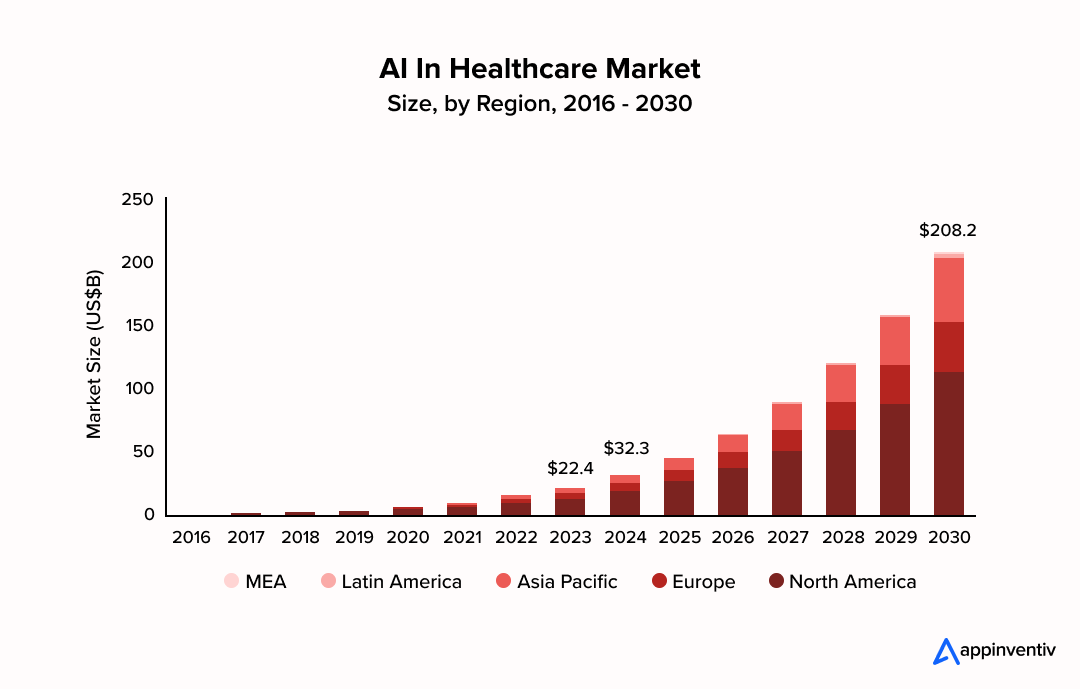
Healthcare leaders clearly recognize this shift. In fact, more than 80% of health system executives expect generative AI to have either a “significant” (26%) or “moderate” (55%) impact on their organizations in 2025. With over 70% of healthcare providers, payers, and tech firms already launching proofs-of-concept or live use cases—from AI chatbots to automated documentation—GenAI is rapidly becoming the new operational standard, not just a future trend.
Enterprises leverage AI for predictive analytics, while startups deploy chatbot-driven apps to ease ER bottlenecks. Integration with EHRs demands robust APIs, enabling seamless workflows for hospital networks or lean startup platforms.
Another key driver of AI adoption is the cost efficiency it brings to hospital administration, particularly through the automation of claims processing. Moreover, emerging HealthTech AI trends include blockchain for secure data sharing and IoT for remote vitals monitoring, fueling personalized care.
In summary, the growth of AI in healthcare isn’t just about technology — it’s about solving systemic problems at scale, with a focus on patient care and safety.
Navigating AI in Healthcare: Key Questions Driving Smart Investment Decisions
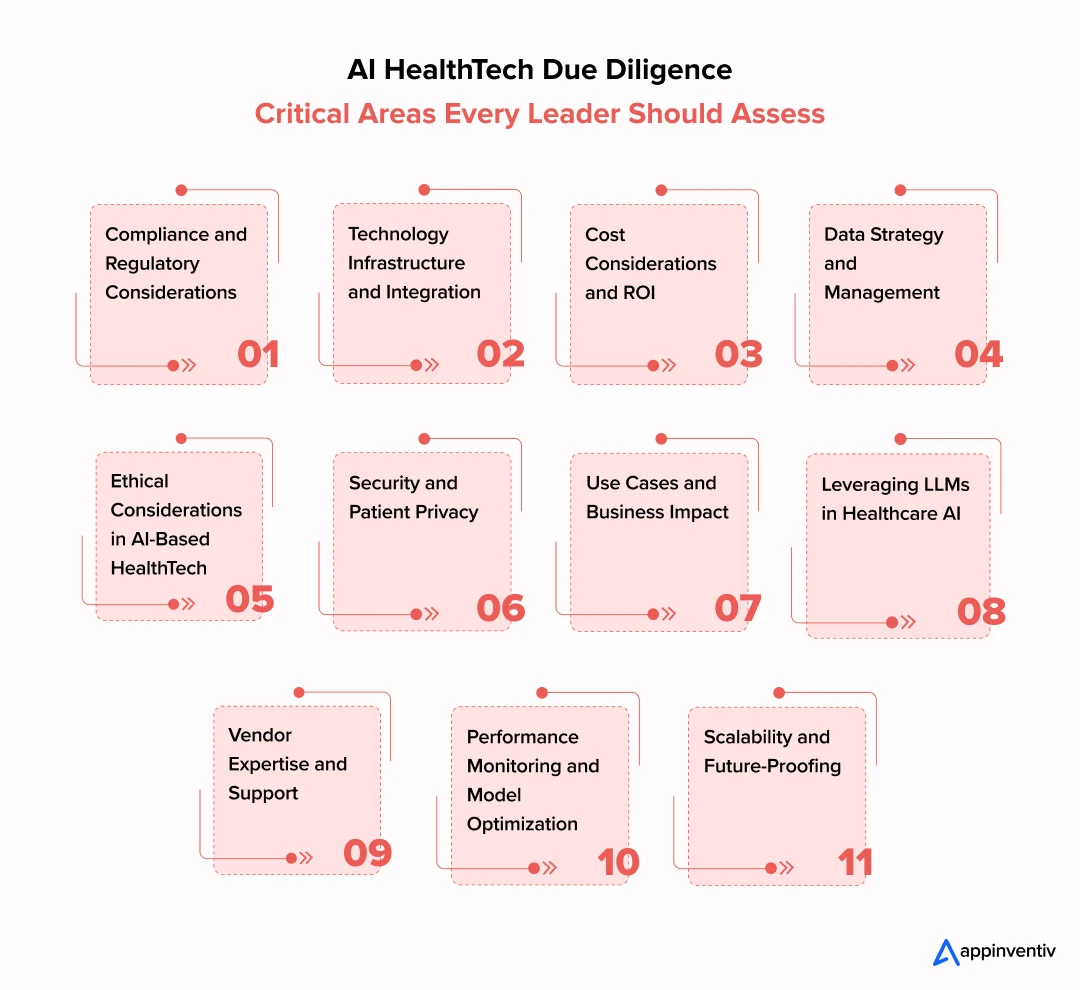
For AI to create a measurable impact, leaders must move beyond pitch decks and start asking the right questions — ones rooted in clinical reality, data maturity, and long-term scalability.Before making any AI investment in healthcare, organizations must first understand and address the key barriers to AI adoption that could derail their digital transformation efforts.
What follows isn’t just a checklist, it’s a strategic lens—a set of core considerations designed to help you evaluate whether an AI solution is ready for your organization’s challenges today, and built to grow with you tomorrow.
Compliance and Regulatory Considerations
In the high-stakes world of AI-based HealthTech, healthcare compliance is the foundation of trust and impact. With over 369,107 HIPAA violation complaints filed with the Office for Civil Rights (OCR) since 2003, and the PHI of 276,775,457 individuals exposed in 2024 alone, healthcare AI regulations demand rigorous scrutiny.
Ask these questions to secure your AI investment in healthcare:
How does the AI solution ensure compliance with HIPAA, GDPR, and other regional data protection laws?
To protect patient data at any cost, HIPAA-compliant AI-based solutions should implement encryption and de-identification of such data. Ask how vendors can help to achieve certifications and conduct audits to comply with HIPAA, GDPR, and local and international healthcare compliances to protect the privacy of patient information through AI without the risk of a financial penalty.
How does the AI vendor handle data access and control?
Ask how vendors ensure patient data privacy in AI, with secure access protocols and clear ownership for your organization, using secure cloud or on-premises storage. Enterprises managing global systems require centralized control, while startups need lightweight solutions that scale without complexity.
This helps startups build trust and enterprises manage global patient networks, especially as healthcare providers heavily rely on inadequate protocols.
What is the vendor’s approach to maintaining compliance with healthcare industry regulations?
The laws can change with the passage of time, and your healthcare AI products should be able to adjust to this shift. One of the key reasons why proactive monitoring is important is that a strategic partner can ensure that the solutions comply with laws in different regions. This is important to those enterprises that already have an international presence and also to startups that plan to be rapidly expanding.
Technology Infrastructure and Integration
Seamless technology adoption and integration are the backbone for enterprises and startups building AI healthcare apps. HealthTech systems must ensure that solutions enhance patient care without breaking operations.
These questions guide your investment in technologies for building healthcare AI solutions:
What is the level of integration with existing health information systems (EHR, EMR, telemedicine platforms)?
The well-developed AI healthcare infrastructure is integrated into systems, such as Epic or Teladoc, to improve diagnostics and telehealth, making them more accurate. Advanced API integration is necessary for enterprises to help connect complex networks using the core of the business.
Make sure your vendor customizes AI to your technology stack in order to achieve seamless integration and continuity of care.
What are the integration timelines and potential disruptions to current workflows?
AI systems sit inside an already complex ecosystem of EHRs, PACS, LIMS, billing systems, and compliance protocols. If integration takes months or causes downtime in critical systems, the risk can outweigh the reward. Consequently, the vendors must be able to lay out potential plans that reflect the timeline based on your demands.
Every new technology comes with a learning curve, and therefore, make sure the vendors are willing to train the concerned team and roll out programs gradually in phases so that the workflow is not disrupted.
What is the scalability of the AI solution for multi-site or multi-region healthcare operations?
Make sure that the solution is scalable and can support not only multiple locations or serve in multiple lines but also enable the support of any future changes. The scalability of healthcare AI allows enterprises to grow by merging with operations around the world. Ensure flexibility, i.e., request vendors how their solutions respond to the increased patient data or trends like telehealth in the long term.
Cost Considerations and ROI
64% of healthcare organizations that have adopted AI technology like Generative AI are already seeing an increase in ROI (Source: McKinsey). However, as AI adoption grows in healthcare, it demands strategic planning to ensure value for enterprises investing in building these solutions.
HealthTech organizations must strike a balance between investment and measurable returns, aligning with patient care goals. Ask these questions to anchor your strategy:
What are the initial and ongoing costs associated with AI implementation and maintenance in healthcare?
Healthcare investment in AI includes not only development and integration costs but also the cost of updating and maintaining AI models. More sophisticated systems, such as predictive diagnostics, are more expensive for enterprises; new companies can use cost-effective systems such as chatbots.
Ask vendors for transparent budgets detailing recurring costs to avoid surprises and align with your financial goals.
How significant will the ROI be by adopting AI in certain departments (i.e., diagnostics, customer service, administrative tasks)?
Identify defined KPIs to quantify healthcare AI ROI, including better radiology diagnostic performance, faster patient wait times in customer service, or decreased administrative workforce. Ensure that vendors can connect AI to deliver targeted results, such as enhanced patient retention or a streamlined supply chain.
What will be the duration of waiting for tangible outcomes of investments in AI?
Businesses can see results from patient engagement tools in months, whereas AI-based integration in whole departments may take a year in enterprises, all depending on technology use and integration. HealthTech organizations must adapt to these new technological environments; therefore, they must confirm that vendors offer training and clear schedules to deliver results without derailing operations.
Data Strategy and Management
Since healthcare relies on a variety of data to articulate its outcomes, the concept of AI in healthcare data management becomes crucial among businesses developing solutions. Big data in the HealthTech spectrum should include a robust data strategy that presents information on the one hand and remains ethical on the other.
Ask these questions to inform how you want to proceed:
The AI system works on structured and unstructured types of healthcare data. How does it work?
Both unstructured and structured forms of data, including patient records, medical images, and notes by physicians, are incorporated into successful HealthTech data management processes. HealthTech solutions have to integrate complex information and handle a range of data using AI in real time. Ensure that vendors support different types of data to enable accurate clinical applications.
What is the data quality assurance procedure, data cleansing, and validations?
The quality of healthcare AI lies in proper inputs. Therefore, vendors must implement rigorous cleansing—like removing duplicates—and validation protocols to ensure reliable outputs, such as precise diagnostics. Ask your vendors how they maintain data integrity, critical for startups proving credibility and enterprises scaling trust.
What is the structure of the AI formulation in handling big data and harnessing power in healthcare?
Big data in HealthTech involves the processing of population health records or information from clinical trials to enable informed action. Enterprises need systems to analyze vast datasets with effective solutions for targeted analytics. Confirm vendors’ design AI to scale with growing data volumes.
What are the key ethical issues in building AI solutions for healthcare?
Data bias should be addressed in AI healthcare ethics to ensure fairness and equity. Biased datasets can skew diagnostics, harming patients. Vendors must use diverse data and regular audits to promote equitable outcomes, vital for startups and enterprises to build trust.
What are the limitations of AI in healthcare?
AI limitations in healthcare include a lack of emotional bonds in patient care. AI cannot replicate human empathy, so providers must pair it with human interaction, ensuring startups and enterprises maintain compassionate care alongside technical precision.
Ethical Considerations in AI-Based HealthTech
As AI technologies take on increasingly critical roles in diagnostics, decision-making, and patient communication, ensuring ethical implementation becomes non-negotiable. From fairness in data training to transparency in decision logic, healthcare AI must align with ethical standards that protect patients, promote equity, and enhance trust.
Ask these questions to guide your organization’s ethical AI adoption:
How does the vendor address algorithmic bias in healthcare AI models?
Bias in training data—such as underrepresentation of certain age, gender, or ethnic groups—can lead to dangerous inaccuracies. Ask whether the vendor uses diverse, inclusive datasets and whether they routinely audit model performance for disparities across demographics.
What frameworks or guidelines are followed to ensure fairness and explainability in AI decisions?
AI models used in patient care must provide interpretable outputs. Ensure that the vendor incorporates explainable AI (XAI) methods and adheres to ethical frameworks like the WHO’s “Ethics & Governance of AI for Health” or the FDA’s Good Machine Learning Practice (GMLP).
Does the AI system allow clinicians to override or question automated decisions?
To maintain clinical autonomy, healthcare AI systems must be built with override capabilities and clear reasoning trails. Ask if clinicians can access confidence scores, justification metrics, or alternative outcomes before accepting AI-generated recommendations.
How are patients informed about the use of AI in their care decisions?
Transparency also extends to patients. Vendors should support features that allow organizations to disclose AI involvement in care, especially in diagnosis or treatment suggestions. Ask how the solution ensures informed consent while respecting digital literacy levels.
What ongoing ethical review or monitoring mechanisms are in place post-deployment?
Ethical responsibility concerns don’t end at deployment. Ask how vendors monitor unintended consequences, such as shifts in diagnosis accuracy across population groups, and whether they have an internal ethics board or conduct regular third-party reviews.
Security and Patient Privacy
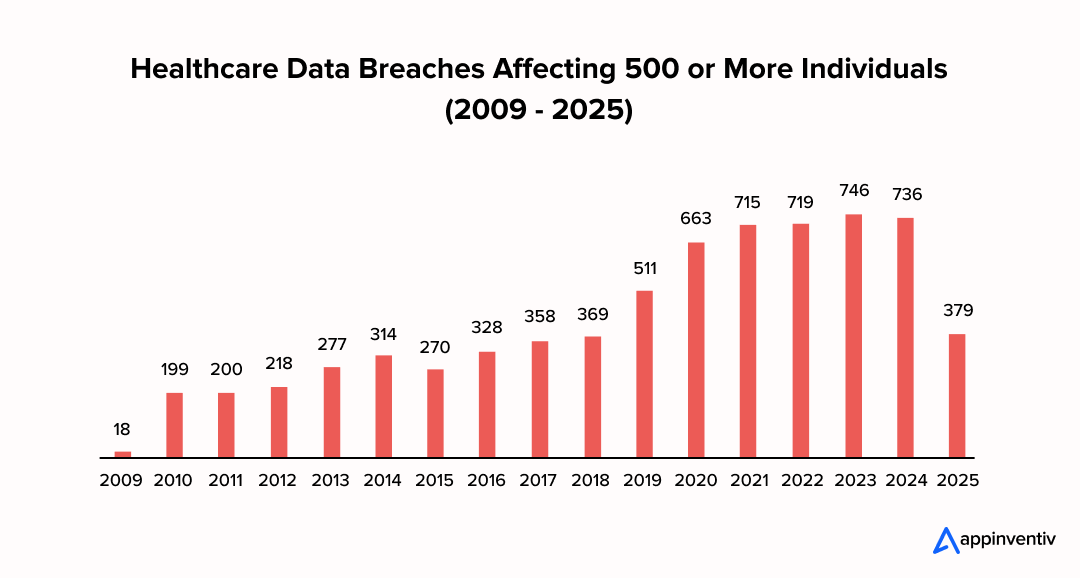
With the rise of cybersecurity threats in healthcare, AI in healthcare security is crucial for enterprises developing medical software. Patient data privacy in HealthTech ensures trust and compliance, protecting sensitive data while enabling innovation.
Ask these questions to fortify your strategy:
How does the AI solution ensure the security of sensitive patient data?
When it comes to AI in healthcare, no concern is more critical—or more regulated—than patient data security. HIPAA, GDPR, and country-specific data laws leave no room for error, and any breach can damage both finances and trust.
Before investing, leaders need to understand exactly how the AI system handles PHI across its lifecycle—from ingestion and training to deployment and storage.
We help you design, vet, and implement AI solutions that meet HIPAA, GDPR, and other global standards.
What are the AI solution’s capabilities for detecting and responding to cybersecurity threats?
Healthcare AI cybersecurity requires real-time anomaly detection to identify breaches, such as unauthorized access to patient data. Enterprises benefit from AI-driven threat response across networks; startups need rapid alerts for smaller systems. Ensure vendors embed proactive monitoring to address risks swiftly.
How do you ensure that AI models remain secure throughout their lifecycle?
Ongoing security is vital. Vendors must conduct regular audits and vulnerability assessments to protect AI in healthcare security from evolving threats. Enterprises need continuous updates for global operations and require agile maintenance to stay secure without heavy costs. Ask for detailed lifecycle protection plans.
What is the biggest challenge AI implementation is currently facing in healthcare? Security and privacy remain the top challenges in the healthcare industry. Breaches impact patient trust, which is a critical concern for enterprises managing reputations. Address this by prioritizing patient data privacy in HealthTech through transparent data practices and staff training, ensuring AI enhances care without compromising safety.
Use Cases and Business Impact
As AI reshapes patient care, its use cases in healthcare are redefining how organizations deliver, scale, and compete. When applied strategically, AI doesn’t just improve clinical outcomes—it rearchitects operations, optimizes resource allocation, and creates entirely new standards for patient experience and care delivery.
Ask these questions to harness AI’s full potential:
What are the specific AI use cases that will generate the most value for our healthcare organization?
Pinpoint high-impact AI for healthcare efficiency applications like AI-driven triage to prioritize urgent cases or predictive analytics to forecast disease progression. Enterprises can overhaul hospital workflows or integrate hyper-personalized care delivery services, depending on the requirements.
Identifying the right-fit use cases—whether it’s predictive diagnostics, workflow automation, or real-time patient monitoring—ensures investments support both short-term wins and long-term transformation.
What are the ways through which the AI model will optimize clinical decision support systems (CDSS)?
AI can bring real-time insights into CDSS by identifying patterns in EHR data, surfacing evidence-backed recommendations, and reducing alert fatigue through intelligent filtering. The goal is not just support, but smarter, context-aware decisions that improve clinical outcomes. Ensure that vendors integrate AI into workflows without overwhelming clinicians.
In non-clinical functions (e.g., scheduling, administrative duties), how can AI be used to increase efficiency and decrease spending?
Artificial intelligence changes the way the administration operates, from scheduling patients to simplifying claims procedures, thereby reducing mistakes and delays to a minimum. Intelligent bots can handle repetitive workflows, while predictive algorithms forecast staffing needs or flag billing errors—freeing up human teams to focus on more complex, value-driven work.
Ask vendors how AI delivers measurable savings, like faster patient throughput or reduced administrative overhead.
What are the strengths and weaknesses of applying AI to healthcare?
AI brings undeniable strengths—speed, scale, and data-driven precision. It accelerates diagnostics, streamlines workflows, and unlocks predictive insights that were previously impossible. But its limitations are equally real. Clinical nuance, data quality issues, and algorithmic bias can affect performance. Not every task benefits from automation, and poorly implemented AI can add friction instead of solving it. Understanding both sides is crucial to set the right expectations before rollout.
Leveraging LLMs in Healthcare AI
As large language models (LLMs) like ChatGPT and Gemini mature, healthcare organizations are beginning to explore their use in patient engagement, clinical decision support, medical transcription, and more. These AI systems bring unmatched natural language understanding and generation capabilities, but their integration into healthcare environments requires careful scrutiny to ensure accuracy, safety, and compliance.
[Also Read: An Explorative Guide to LLM Fine Tuning – Implications, Applications, Methods, Best Practices]
Ask these questions to assess whether LLMs are ready to support your healthcare operations:
How accurate are LLM-based models in understanding and generating clinical content?
LLMs trained on general-purpose data may struggle with domain-specific vocabulary or misinterpret clinical context. Ask whether the model has been fine-tuned on medical literature, and whether it can reliably understand structured data (like EHRs) and unstructured inputs (like physician notes or patient questions).
We help healthcare organizations evaluate and implement LLMs fine-tuned for medical accuracy—ensuring better context, fewer errors, and real clinical value.
How does the LLM handle sensitive patient data in line with HIPAA and GDPR regulations?
Because LLMs may store or process sensitive information, vendors must demonstrate rigorous security and privacy safeguards. Ask how personally identifiable information (PII) is protected during inference, how data is anonymized or de-identified, and whether the system avoids storing PHI unless explicitly permitted.
Can the LLM integrate with existing clinical systems such as CDSS, EHRs, or chatbots?
To be truly valuable, LLMs must seamlessly connect with your existing infrastructure. Ask whether the model supports integration via APIs or FHIR standards, and if it can pull real-time clinical data to provide relevant outputs within workflows such as triage, documentation, or discharge planning.
What measures are in place to mitigate hallucinations or inaccurate outputs from LLMs?
LLMs are known to occasionally generate confident-sounding but incorrect information—known as hallucinations. Ask vendors what guardrails are in place to prevent this, such as fact-checking layers, retrieval-augmented generation (RAG), or human-in-the-loop review systems before clinical outputs are finalized.
How does the LLM ensure fairness and avoid bias across diverse patient populations?
Bias can surface if the LLM hasn’t been tested across different age, gender, racial, or socio-economic segments. Ask if the vendor has performed fairness evaluations, used representative datasets for training, and implemented post-processing techniques to reduce skewed outputs.
How can LLMs enhance patient engagement and improve communication in care delivery?
LLMs can be powerful tools for personalized health education, symptom triage, or multilingual support. Ask how the AI adapts language based on patient profiles, simplifies complex medical jargon, or provides round-the-clock support through conversational interfaces in apps or portals.
Vendor Expertise and Support
The success of AI in healthcare depends heavily on the vendor’s understanding of real-world constraints, not just their technology stack. For enterprises building AI for healthcare support, a proven partner ensures seamless adoption and lasting impact.
Ask these questions to select an experienced vendor that provides total assistance:
What is the vendor’s experience in the healthcare AI sector, and can they provide relevant case studies?
Healthcare presents unique challenges, from regulatory scrutiny to complex data interoperability. Vendors with a proven track record in this space understand those nuances and can preempt potential pitfalls. Case studies showing successful deployment, adoption, and measurable clinical or operational impact demonstrate whether the vendor can turn pilot projects into enterprise-grade solutions. Look for partners who speak the language of clinicians and compliance, not just code.
What level of ongoing support will be provided post-implementation?
Each new technology has a learning curve, so robust post-implementation support is essential. Enterprises need comprehensive services—troubleshooting, regular updates, and staff training—to maintain complex systems. Ensure vendors commit to tailored maintenance and customization to keep your AI solution aligned with evolving goals.
What type of customer success or account management will we receive during the deployment phase?
In healthcare, the deployment phase can be the most sensitive part of the process. Whether you’re integrating with legacy EHRs or onboarding multiple clinical teams, strong vendor-side support is essential.
Ask about dedicated account managers, clinical onboarding resources, and change management expertise. Will you have a single point of contact? Is there a support team trained in healthcare-specific workflows? How fast do they respond when something breaks?
The right partner doesn’t just hand over the tech—they stay present through go-live, resolve integration hiccups, and align with your internal rollout goals. Great customer success means fewer delays, smoother training, and faster ROI.
Performance Monitoring and Model Optimization
To keep AI-driven diagnostics and triage sharp in healthcare’s fast-evolving landscape, AI in healthcare performance monitoring demands precision tools and adaptive processes. Enterprises integrating AI across hospital systems and startups deploying targeted solutions need robust monitoring to ensure clinical reliability.
These questions sharpen your AI strategy:
How will we monitor the performance of AI models in real time?
Effective monitoring uses platforms like performance dashboards to track metrics such as precision in AI-driven cardiac risk assessments. Enterprises require centralized systems to oversee AI across multiple specialties; startups need compact tools to evaluate tools like chatbot response accuracy. Ask vendors for solutions with real-time alerts for anomalies, ensuring AI aligns with patient outcome goals.
What is the process for continuously improving and optimizing AI models post-deployment?
Ongoing optimization relies on structured retraining, like updating models for diabetes outcome prediction with new patient glucose data. Enterprises benefit from automated retraining pipelines handling vast EHR datasets; startups need efficient workflows for refining tools like mental health screening algorithms. Ensure vendors detail how they incorporate fresh data to maintain model accuracy without disrupting care delivery.
How will AI solutions be adjusted to accommodate changing healthcare regulations or emerging trends?
Adaptive AI for HealthTech must comply with evolving standards like the FDA’s AI/ML-based Software as a Medical Device framework or emerging genomic testing protocols. Enterprises need vendors to integrate regulatory updates across global operations; startups require flexible recalibration for applications like AI-assisted radiology. Confirm vendors conduct regular model audits to address trends like personalized medicine, keeping AI effective and compliant.
Scalability and Future-Proofing
Imagine a hospital chain expanding to rural clinics or a startup adding AI-driven drug discovery—AI healthcare scalability must match ambition with adaptability. Enterprises and startups need AI that scales effortlessly and evolves with healthcare’s next wave. These questions ensure your solution is built for tomorrow:
How scalable is the AI solution as our healthcare organization grows or expands its service offerings?
Your AI must handle exponential growth, like scaling a triage system from one clinic to a multi-state network. Businesses must have tools capable of handling massive patient-related information in various fields such as cardiology or orthopedics. Moreover, they must also enable startups to modernize telehealth care for chronic disease monitoring. Ask vendors how their solution can achieve performance with an increasing workload.
What are the technological advancements and healthcare trends of the AI solution, and how well does it future-proof the solution?
Future-ready HealthTech AI will be able to run alongside other emerging technologies, such as edge computing to monitor vitals in real-time or blockchain to share patient data in a secure way. Businesses have to be able to adapt to the global change and change their frameworks to niche breakthroughs, such as using AI in immunotherapy. Make sure that vendors remain compatible with future systems through the use of open APIs.
What is the future of AI in healthcare?
AI-driven healthcare evolution will prioritize hyper-personalized care, like tailoring cancer treatments via genomic data. Enterprises will unify AI across global facilities; startups will innovate with focused tools like virtual mental health coaches. Ask vendors how their AI aligns with these long-term shifts.
How will AI change healthcare?
AI healthcare transformation will streamline care delivery, from automating discharge planning to enable virtual ICUs. Enterprises can optimize system-wide efficiency; startups can disrupt with patient-centric tools. Therefore, confirm your vendors place your AI-driven healthcare solutions to lead in this new era of care.
Real-World Impact: How Appinventiv Delivered AI-Powered Healthcare Success
At Appinventiv, we have a decade of experience redefining the healthcare industry, powered by AI technology. We have built over 1000 AI-powered applications and digital products for various industry giants like KFC, IKEA, and KPMG, and secured over $800 million in funding for startups.
Named Top Android & Chatbot Development Company 2025 and Fastest-Growing Company 2025 by Clutch, we craft healthcare AI solutions that slash wait times and medical care precision.
Want to know how we achieve that? Take a look at the case study of our multi-request format platform for in-hospital patients, YouCOMM, which we developed. This platform helps patients connect with nurses. It is a fully customizable app that prioritizes accessibility and inclusivity by offering various options, including voice commands and head gestures.
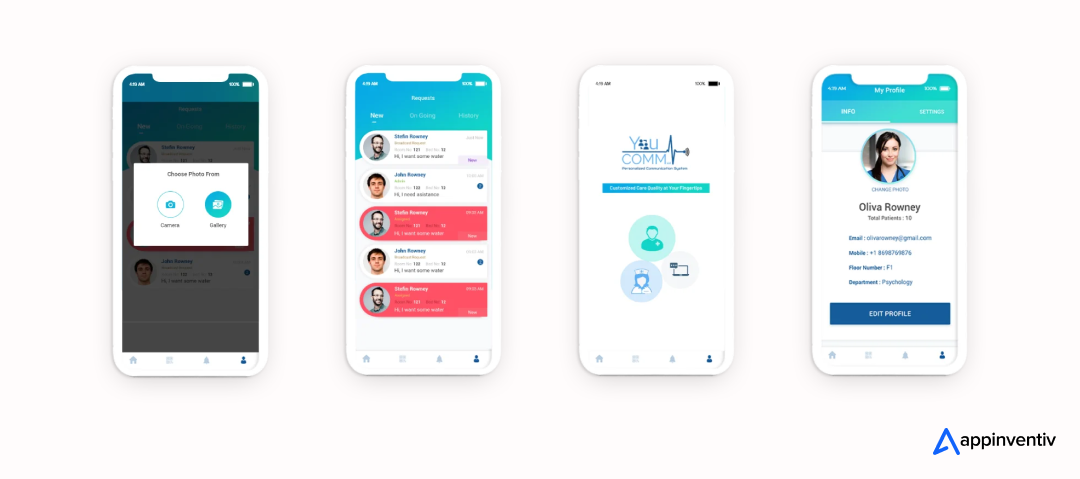
We also developed DiabeticU, a diabetes management app that offers users real-time tracking, educational resources, and smart lifestyle suggestions based on their health data. At the core of the app is an AI-powered wellness recommendation engine that analyzes real-time user data—including glucose levels, meal patterns, and activity—to deliver personalized lifestyle suggestions. These recommendations help users make smarter decisions about their nutrition, medication, and daily routines, ultimately reducing complications and improving long-term outcomes. By combining behavioral tracking with AI-led insights, the platform elevates chronic care into continuous, personalized wellness.
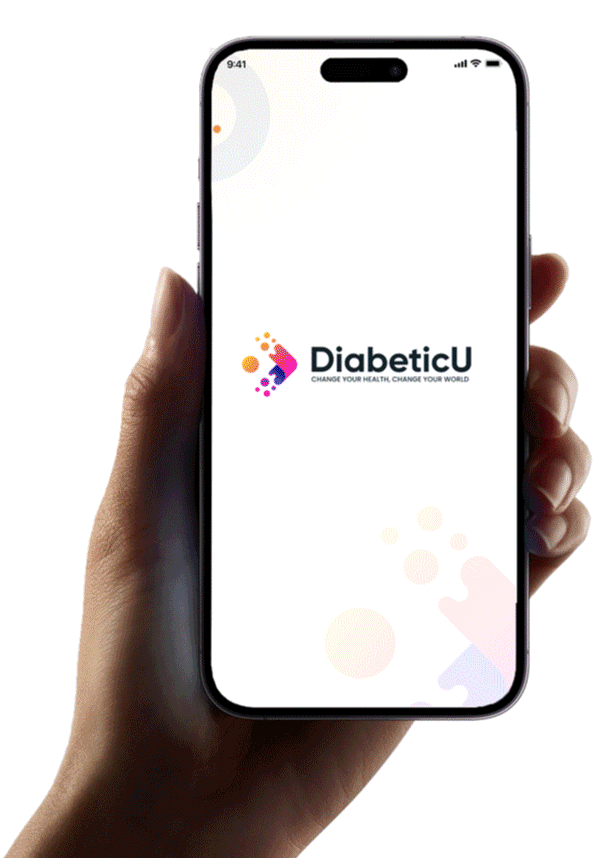
Our healthcare software development services are HIPAA-compliant and integrate seamlessly with EHRs, while scalable architectures support trends like IoT patient monitoring. We have ‘GDPR-Ready’ architecture for global HealthTech platforms, ensuring compliance across international markets. With dedicated support and continuous model retraining, we empower healthcare enterprises and startups to tackle regulatory risks and drive lasting impact in the future of medicine.
With dedicated support and continuous model retraining, we empower healthcare enterprises and startups to tackle regulatory risks and drive lasting impact in the future of medicine.
Each new technology has a learning curve, and these questions stand to guide you in choosing a company for healthcare app development services that acts as a strategic partner to your vision. By choosing a healthcare app development partner like us, you will be able to develop future-proof AI applications that will have a significant effect on your company.
FAQs
Q. How does AI ensure compliance with healthcare regulations?
A. AI in healthcare compliance must have end-to-end encryption and frequent audit sessions to meet HIPAA and GDPR standards. To abide by the changing regulations, vendors should supply compliance certifications and automated updates to make sure that an enterprise will not face any fines and startups will be able to build trust-based relationships without any legal factors involved.
Q. What ROI can healthcare organizations expect from AI?
A. Healthcare AI ROI depends on clear KPIs:
- Diagnostics: Improved radiology accuracy, reducing misdiagnosis costs.
- Operations: Automated billing cuts labor expenses by streamlining claims.
- Patient Engagement: Triage chatbots boost retention.
Work with vendors to define measurable outcomes tailored to your goals.
Q. How does AI integrate with existing healthcare systems?
A. Seamless AI HealthTech integration connects AI to EHRs like Epic or Cerner using robust APIs. For enterprises, this unifies multi-site workflows; for startups, lightweight solutions enable quick deployment. Vendors must offer phased rollouts and training to prevent disruptions, ensuring smooth clinical operations.
Q. What expertise should we seek in an AI vendor?
A. AI healthcare vendor expertise is critical. Seek vendors with case studies in:
- Optimizing hospital triage for faster patient flow.
- Enhancing diagnostics, like AI-driven oncology insights.
Demand dedicated account teams for enterprises or agile support for startups to ensure successful implementation.
Q. Can AI scale with our organization’s growth?
A. Scalable AI supports growth from single clinics to global networks. Enterprises need platforms handling massive patient data for specialties like cardiology; startups require modular tools for pivoting to telehealth or genomics. Vendors must ensure performance stability and adaptability to trends such as IoT integration, keeping their solutions future-ready.


- In just 2 mins you will get a response
- Your idea is 100% protected by our Non Disclosure Agreement.

How To Build A Custom Behavioral Health Software? Costs, Features & Compliances
Key Takeaways Custom behavioral health software development supports the unique needs of therapy work that many general EHR tools do not cover well. Start with the foundational modules. Clinical notes, scheduling, billing, and security should be the first modules you build. Treatment plans and consent controls are important for safe and organized care, so they…
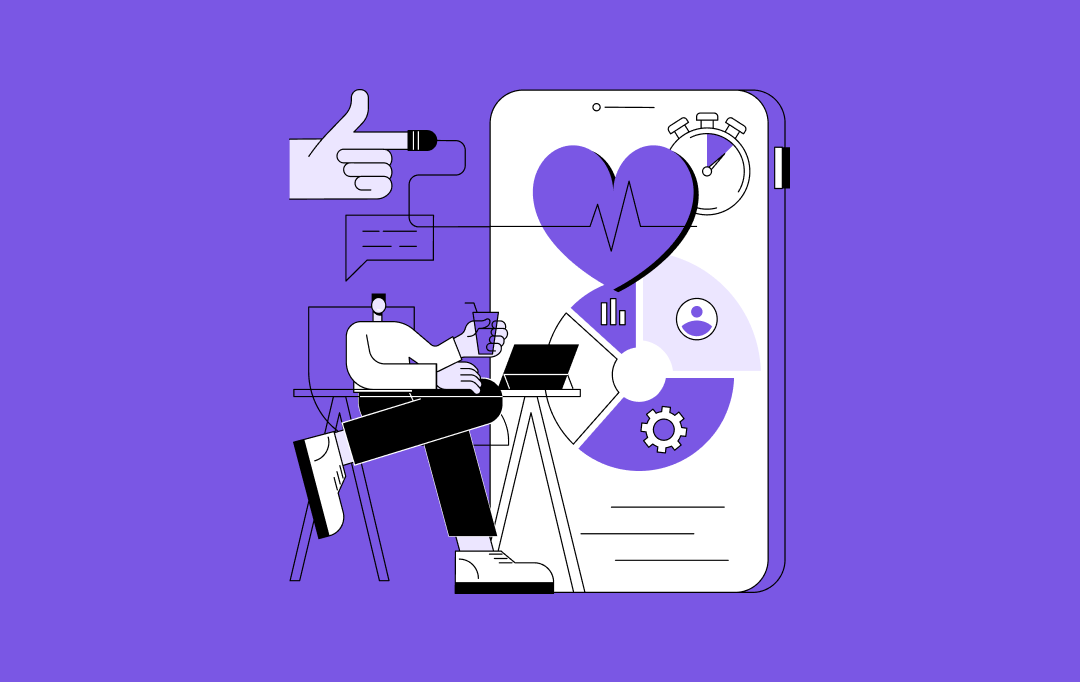
How Custom Healthcare App Development is Powering Digital-First NHS Care
Key Highlights: NHS teams are moving fast toward digital-first care, and custom apps are filling gaps that the standard NHS App cannot cover. Custom healthcare apps help reduce workload, cut waiting times, and improve how patients access care across Trusts and ICS regions. UK rules such as DTAC, NHS DSP Toolkit, NHS Login, and UK…

How to Implement Denial Management Automation in Healthcare
Key Takeaways Denial management works best when prevention is prioritized before recovery, starting at registration, eligibility, and authorization. Automation delivers the most value when introduced in phases, aligned with existing revenue cycle maturity. Clean data, clear ownership, and consistent denial categorization matter more than tools alone. Analytics and AI help teams focus on high-impact denials,…





































